![]()
Thousands kilometers from Brittany, to the south-east, following the arc of circle left by the megalithic civilization , on the islands of the Maltese archipelago, Malta and Gozo, ther are colossal structures which count among the most complex and strangest ancient testimonies of the megalithic world . These monuments come from a purely autochthon culture and do not have any correspondent known so far. Although all were used , in the beginning, as burials, they constituted places of worship.
** The Hypogee of Hal Saflieni
Cut in a limestone hill, this monument is a necropolis which contained up to 7000 bodies. Throughout the centuries the sepulchral rooms were increased, new corridors were dug leading to new recesses, finally the whole monument forms an underground structure of 33 rooms on 3 levels, a real labyrinth .
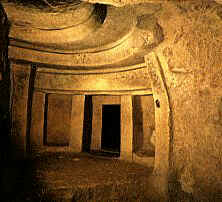 |
An underground anteroom, whose rockwalls are carved in elegant pillars, gives access by a porch to the heart of the Hypogee |
** Goddesses
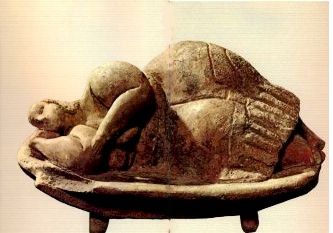 |
On the left : small terra cotta 10 cm statue
was discovered in the sanctuary of Hal Saflieni Who is she ? The goddess of fertility or
the priestess of the sanctuary? On the right : another image of the goddess found in Tarxien , Malta Island. |
 |
** Mnajdra
In Mnajdra, on the coast of Malta island , three temples in ruins look like wrecks of ships:
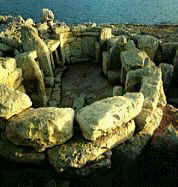 |
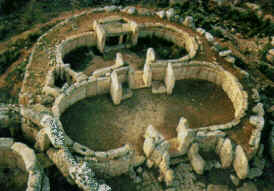 |
| Temple A: Forecourt | Temple B: Entry, Forecourt and passage, Back-yard and Sanctuary |
Although their roof disappeared, their method of construction is revealed by the aspect of the ruins: the walls of temple A are built in corbelling, each layer of calcareous blocks overlapping the preceding one; it resulted a structure in dome whose node was covered with a stone. For the temple B, we see clearly how the blocks of limestone are supported by a important volume of soil followed by a retaining wall made of more massive blocks of stone.
** Ggantija
In the island of Gozo, off Malta, are 2 temples known under the name of " Ggantija ", " gigantic "in Maltese.The largest of the two temples included 3 clover -shaped rooms and was nearly 30 meters wide.
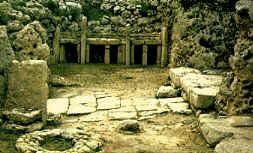 |
In the foreground of the largest room, a stone circle which could be used as ritual hearth; at the rear, table structures the use of which we are unaware of. Maybe did the priestess fell asleep there....... |
** Hagar Qim
Located on the island of Malta, the temple of Hagar Qim testifies of the apogee of the building techniques
|
|
||||||||||
| Plan of the temple of Hagar Qim: at thebottom, on the right, a 6,60m long block . |
Dug in a block of limestone a porch to a room |
Many stones inside are carefully adjusted. An enormous flagstone in the external wall is 6,60 m long; it is the most significant megalithic block of the Maltese archipelago.
![]()
| Back to Summary |  |
Next : The Cyclopean Tiryns |
| © Odile Prigent - Paleologos 1997-2004 | ||